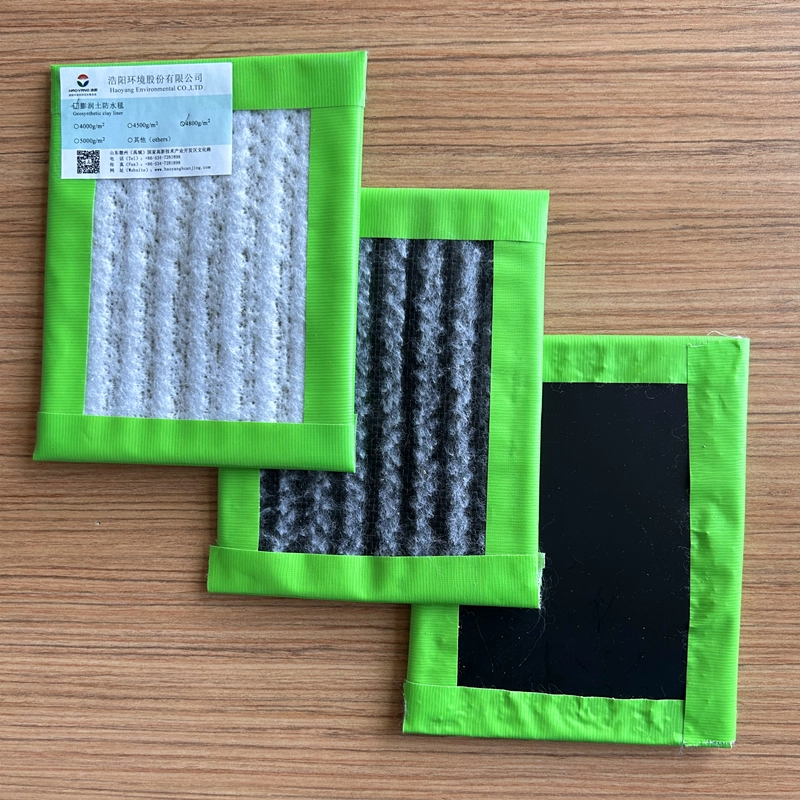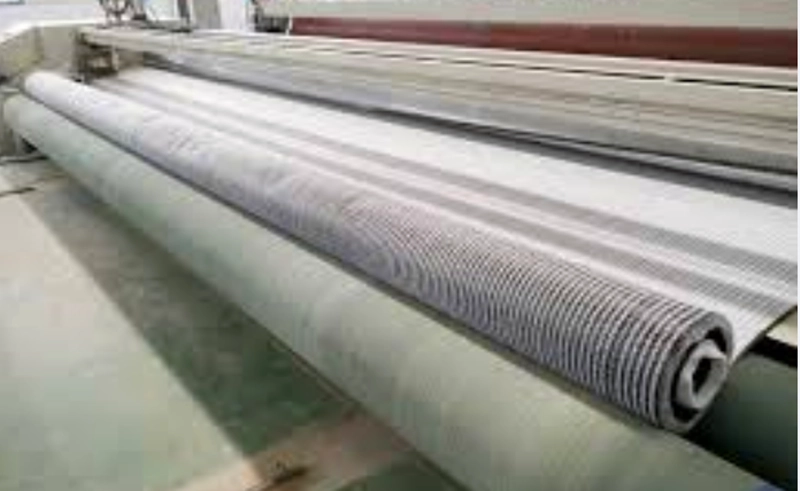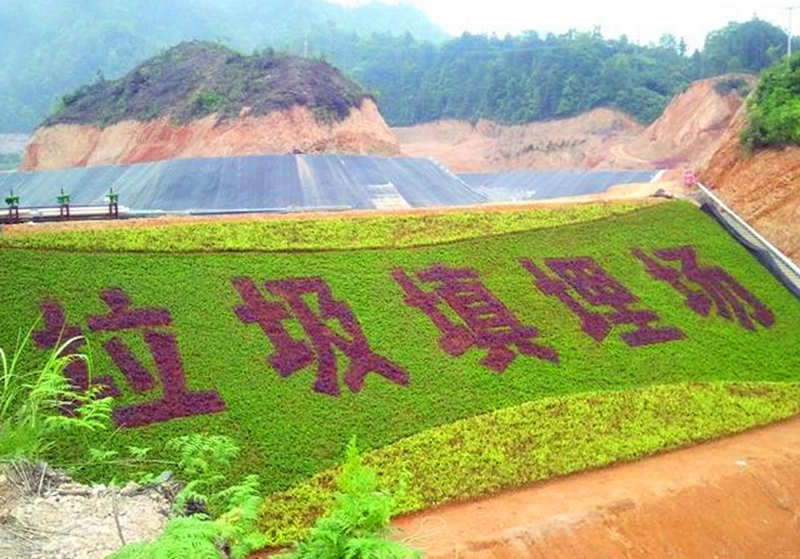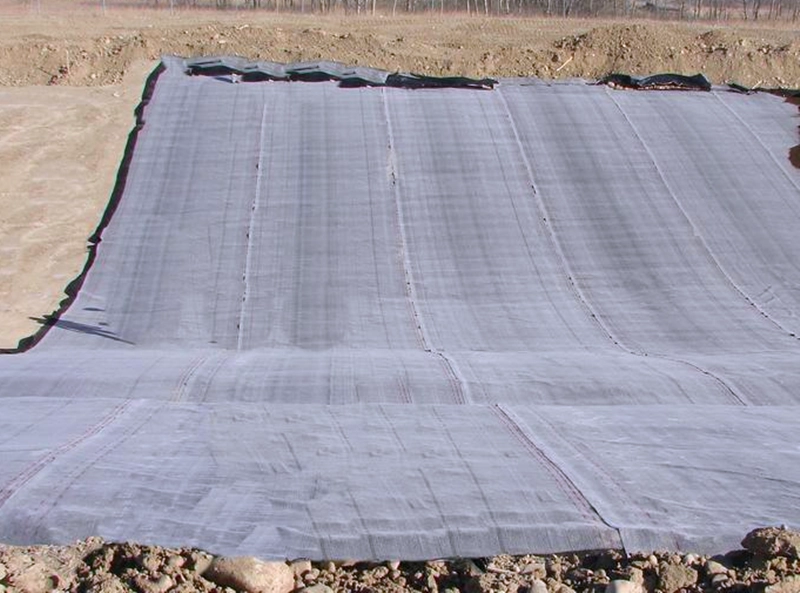What is Geosynthetic Clay Liners?
Geosynthetic Clay Liners (GCLs) are highly efficient anti-seepage materials used in environmental engineering and water conservancy projects. It is composed of natural clay and synthetic materials, with excellent anti-seepage properties and environmental friendliness. The advantage of geosynthetic clay liners is their high anti-seepage properties and low permeability. In practical applications, geosynthetic clay liners are usually used in combination with other anti-seepage materials, such as geomembranes, geotextiles, etc., to achieve better anti-seepage effects. Its construction is simple, the cost is relatively low, and the maintenance cost is also low, so it is favored by project builders in Nigeria.
Product name | |
Certification | CE, SGS, TUV, ISO9001, ISO14001,OHSAS18001 |
Usage | Waterproof and seepage control project |
Length | Normal 30m, can as per your request |
Width | 1-6m or follow clients' demand |
Color | Black, white or as customers' required |
Material | Geotextile + Bentonite + Nonwoven fabric |
Standard | ASTM GRI-GM13/M17/China standard |
Application | Artificial lake,pond liner ,domestic garbage landfill,mining&chemical industry,roof garden,fish pond,reservoir etc. |
Packing | PP woven plastic bags tied with plastic belts,easy to unload |
That's the basic information about Geosynthetic Clay Liners. Whether in Nigeria or other Belt and Road countries, as long as you need Geosynthetic Clay Liners in infrastructure construction, you should first learn about this information.

Current status of Nigeria's infrastructure
In recent years, Nigeria has witnessed a significant surge in infrastructure development, with a particular focus on key sectors such as electricity, transportation, and communications. The government's issuance of the "Electricity Act" in June 2023 exemplifies its commitment to decentralizing the power industry and enhancing the business environment for power infrastructure, thereby promoting the expansion of clean energy sources and the modernization of the country's power grid.
Transportation infrastructure has also seen substantial investment, in line with the "National Comprehensive Infrastructure Master Plan (2020-2043)." This plan underscores Nigeria's efforts to boost transportation infrastructure investment, leading to an accelerated pace in project execution. Simultaneously, the communication industry has experienced rapid growth, driven by increasing demand, resulting in the swift development of communication infrastructure and networks, offering ample opportunities for contractors from various nations.
However, Nigeria's economic and social progress faces hurdles due to inadequate transportation infrastructure. Despite a national highway network spanning 195,000 kilometers, significant portions, particularly in the southeast and northwest, suffer from severe damage exacerbated by the rainy season and insufficient maintenance. Approximately 40% of federal roads are in dire need of repair. Rail transportation, predominantly comprised of narrow-gauge single-track lines covering 4,332 kilometers, lags behind.
On the other hand, Nigeria boasts relatively developed air and maritime transport systems, with 22 major airports, 8 significant seaports, and 11 oil terminals among its infrastructure assets. This strategic positioning facilitates robust air and maritime transport development. According to forecasts by Fitch Solutions, road transportation will continue to dominate freight movement over the next decade, driven by urbanization and increased freight volume, further underscoring the necessity for enhanced transportation infrastructure in Nigeria. Therefore, there is no doubt that the application prospects of Geosynthetic clay liners (GCLs) in Nigeria will definitely be very broad.
GCL in Nigeria Market Potential
The market potential for geosynthetic clay liners (GCL) in Nigeria appears significant, particularly given the escalating demand for environmental protection and infrastructure development.
Rising Environmental
ConcernsNigeria faces challenges in environmental pollution and resource conservation, notably in sewage treatment, landfill management, and industrial waste control. GCLs offer effective impermeability, aiding in groundwater pollution reduction and soil erosion prevention. Hence, demand for such liners in environmental protection projects is likely to surge.
Infrastructure Development Needs
With Nigeria's accelerating infrastructure development, including roads, dams, and reservoirs, the demand for soil stabilization and waterproofing is escalating. GCLs can serve as effective impermeable layers, enhancing project stability and durability. Therefore, their application potential in infrastructure construction projects is substantial.
Government Policy Support
With the Nigerian government's emphasis on environmental protection and infrastructure development, more policies and regulations may be enacted to encourage the use of eco-friendly materials and advanced technologies. GCLs, as environmentally friendly and reliable impermeable materials, are poised to receive government support and promotion.
Market Competition and Opportunities
While GCLs may face competition from traditional materials and other geosynthetic materials in the Nigerian market, their superior impermeability and versatility may open up new market spaces. Collaborating with international partners to provide customized solutions and technical support could also be an opportunity to capture market share in Nigeria.
Thus, considering environmental protection demands, infrastructure development needs, government policy support, and market competition and opportunities, GCLs hold significant potential in the Nigerian market. However, entering this market requires a thorough understanding of local demands and market dynamics, along with the formulation of targeted marketing strategies and product promotion plans to ensure steady market share growth.
Price List for Geosynthetic Clay Liners (GCL) for Nigeria
| GCL Type | Weight (g/m²) | Roll Dimensions (m) | Factory Price (USD per Square Meter) | Factory Price (USD per Roll) | Application |
|---|---|---|---|---|---|
| Standard GCL | 4000g/m² | 5m x 40m (200m²) | $2.00 - $2.50 | $400 - $500 | Landfill liners, small ponds |
| Enhanced GCL | 4800g/m² | 5m x 40m (200m²) | $2.50 - $3.00 | $500 - $600 | Industrial ponds, leachate containment |
| High-Strength GCL | 5500g/m² | 5m x 40m (200m²) | $3.00 - $3.50 | $600 - $700 | Mining applications, waste containment |
| Reinforced GCL | 6000g/m² | 4m x 30m (120m²) | $3.50 - $4.00 | $420 - $480 | Steep slope stabilization, heavy-duty waterproofing |
| GCL with Geomembrane | 6500g/m² | 4m x 30m (120m²) | $4.00 - $4.50 | $480 - $540 | Enhanced barrier systems, landfill caps |
Note: Prices may vary depending on order quantity, location within Nigeria, and specific project requirements. Discounts are available for bulk orders and long-term supply agreements.
Main Functions and Applications of GCLs in Nigeria
1. The main functions of geosynthetic clay liners (GCLs) in Nigeria include:
Anti-infiltration: Geosynthetic clay liners can effectively prevent the penetration of water, chemicals and pollutants, protecting groundwater and the surrounding environment from pollution. It forms a multi-layer structure by stacking natural clay and synthetic materials layer by layer, which can effectively prevent the leakage of harmful substances and protect the safety of groundwater resources.
Soil protection: It can protect the soil surface from water erosion and erosion, reduce soil loss, and maintain soil fertility and structure. Geosynthetic clay liner has good environmental adaptability and biodegradability, will not cause pollution to soil and water quality, and is in line with the concept of sustainable development.
Stability reinforcement: Geosynthetic clay lining can enhance the stability of the soil, prevent landslides, collapse, deformation and other problems in the soil, and improve the safety and reliability of the project.
Environmental protection: It can effectively isolate and control harmful substances produced in the project and protect the surrounding natural environment and ecosystem.
Water management: Geosynthetic clay liners can be used in channels, reservoirs, dams and other places in water conservancy projects to prevent water leakage and soil erosion and ensure the effective use and management of water resources.
Soil improvement: Through the application of geosynthetic clay liners, the water permeability, moisture retention and aeration of the soil can be improved, providing good environmental conditions for plant growth.
Foundation reinforcement: In foundation projects, geosynthetic clay liners can be used to reinforce the foundation soil and improve the bearing capacity and stability of the foundation.
In summary, geosynthetic clay liners play an important role in engineering construction and environmental protection, providing reliable protection and support for various projects.

2. Geosynthetic clay liners are widely used in the following fields in Nigeria:
Landfills: In the base, side walls and covering layers of landfills, geosynthetic clay liners can be used to prevent bottom leakage and garbage overflow, effectively isolating and controlling pollutants generated by garbage.
Environmental protection projects: Mainly used in environmental protection projects such as landfills, sewage treatment plants, and chemical waste disposal sites to prevent seepage and pollution.
Water conservancy projects: Used for anti-seepage and anti-seepage in water conservancy projects such as reservoirs, dams, canals, and rivers to protect the safety and stability of water resources.
Road and railway engineering: In the construction of roads, railways and other roads, it is used for soil stabilization, roadbed reinforcement and drainage to improve the durability and stability of the road surface.
Mining engineering: Used for anti-seepage and anti-seepage in mine tailings ponds, waste mine pits and other mining projects to protect groundwater resources from pollution.
Land consolidation projects: In land consolidation, desert control and other projects, it is used for soil protection, water resources management and prevention of soil erosion.
Agricultural engineering: Used in agricultural engineering such as water conservancy irrigation, soil protection, and prevention of soil erosion to improve land use efficiency and agricultural production quality.
Coastal protection engineering: used for coastal protection, preventing seawater erosion and protecting the coastal ecological environment.
Landscaping projects: In the construction of urban gardens and green spaces, it is used for soil protection, plant growth promotion and water resources management.

To sum up, geosynthetic clay liners are widely used in the fields of environmental protection, water conservancy, roads, mining, land consolidation, agriculture, coastal protection and landscaping in Nigeria.
Geosynthetic Clay Liners (GCLs) provide an effective solution for waterproofing and environmental protection in various applications, including landfills, mining operations, and industrial ponds. With a blend of sodium bentonite and geotextile layers, GCLs create a self-sealing barrier that prevents water and leachate leakage. For projects in Nigeria, GCLs offer a cost-effective and durable option, suitable for a range of geotechnical and environmental applications.
Manufacturer
Looking for reliable geosynthetic clay liners (GCL) to enhance your infrastructure projects in Nigeria? Look no further than Haoyang Environment. With a reputation for excellence and a commitment to quality, Haoyang Environment is a leading manufacturer of geosynthetic clay liners, providing innovative solutions for a wide range of applications.
Backed by years of industry experience and expertise, Haoyang Environment offers GCL products that excel in impermeability, soil stabilization, and environmental protection. Our products are designed to meet the rigorous demands of infrastructure projects, including road construction, landfill management, and industrial facilities.
What sets Haoyang Environment apart is our dedication to delivering superior products and exceptional service. We prioritize customer satisfaction and strive to exceed expectations with every project. With Haoyang Environment as your partner, you can trust that your infrastructure projects will be bolstered by top-of-the-line geosynthetic clay liners, ensuring long-lasting performance and reliability.
Choose Haoyang Environment for all your geosynthetic clay liner needs in Nigeria, and experience the difference that quality and expertise can make in your projects. Contact us today to learn more about our products and how we can support your infrastructure endeavors.
Contact US
Yingbin Road, Dezhou(Yucheng)national Development Zones for New and High Technology industries
Shandong Province, China

897.webp)
942.webp)
237.webp)